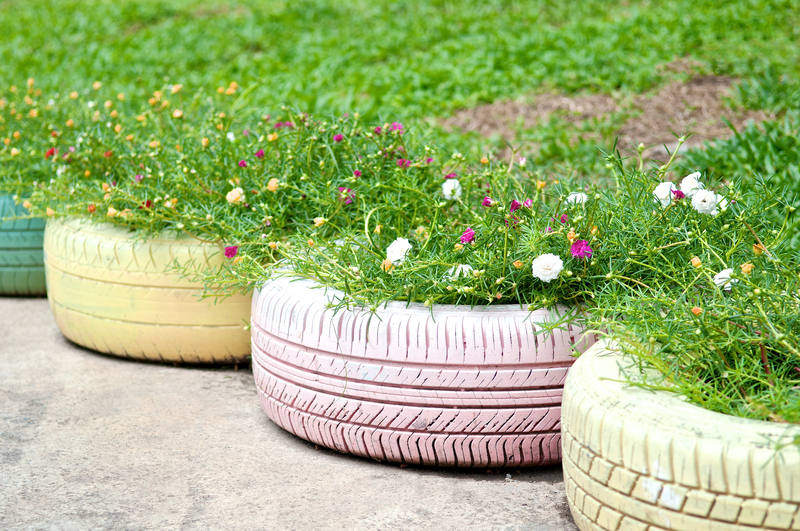Common Skip Hire Mistakes and How to Prevent Them
Hiring a skip is an effective solution for waste disposal during home renovations, garden clearances, or large-scale construction projects. However, many people unknowingly fall into common pitfalls that can lead to additional costs, legal issues, and unnecessary frustration. In this detailed guide, we'll explore the most frequent skip hire mistakes, offering actionable tips and insightful information, so you can make your next waste removal project smooth and hassle-free.

Understanding Skip Hire: Why Proper Planning Matters
Before diving into the errors people make when arranging a skip, it's crucial to understand what skip hire entails. Skip hire is more than just booking a bin and waiting for it to be delivered; there are legalities, logistical considerations, and environmental aspects involved. Proper planning helps avoid common skip hire problems, saves time, and ensures compliance with local regulations.
What is Skip Hire?
Skip hire refers to renting a large open-topped waste container to load and remove non-hazardous waste from a specific location. Skips come in various sizes, ranging from small mini-skips for household use to larger builder's skips for commercial projects.
Why Do People Hire Skips?
- Home renovations
- Garden clearances
- Building and demolition sites
- Clearing out clutter before a move
- Large-scale events
Top Skip Hire Mistakes and How to Avoid Them
Even experienced DIYers and contractors can make blunders when it comes to hiring skips. Let's break down the most common missteps and provide practical strategies to prevent them.
1. Choosing the Wrong Skip Size
Mistake: One of the most frequent skip hire mistakes is underestimating (or overestimating) the required skip size. Booking a skip that's too small results in extra charges when you need another skip, while one that's too big means wasted space and higher costs.
- Mini Skips (2-3 cubic yards): For small DIY jobs or garden cleanups.
- Midi Skips (4-5 cubic yards): Ideal for kitchen or bathroom renovations.
- Builder's Skips (6-8 cubic yards): For bulky construction waste.
- Large Skips (10-12 cubic yards): Suitable for major clearances.
Prevention: Estimate your waste volume as accurately as possible. When in doubt, consult with your skip hire company for advice. It's more cost-effective to get a slightly larger skip than to incur extra collection fees.
2. Ignoring Skip Permit Requirements
Mistake: If you don't have space on private land (like your driveway) for the skip, placing it on public property, such as a road or pavement, requires a permit from your local council. A common error is failing to secure this skip permit, risking fines and forced removal.
Prevention: Check with your local authority about skip permit requirements. Many reputable skip hire companies will arrange the necessary permits on your behalf, so make this part of your initial booking process.
3. Putting Prohibited Waste in the Skip
Mistake: Not everything can go into a skip. Commonly banned items include:
- Asbestos
- Batteries
- Electrical appliances
- Liquids, oils, and paints
- Tyres
- Plasterboard (unless agreed with the skip provider)
- Medical waste
These items pose hazards to people and the environment, and disposing of them incorrectly could land you with hefty fines or extra charges.
Prevention: Always ask for a detailed list of what is and isn't accepted in your skip. If you have restricted items, your skip hire company can recommend alternative waste disposal methods.
4. Overfilling the Skip
Mistake: Overloading the skip above its sides (the "fill line") is both dangerous and illegal. Drivers aren't permitted to collect skips that are overfilled to prevent rubbish falling off during transport. This delays your project and may result in additional fees.
Prevention: Only fill up to the marked fill level. If you think you'll exceed the skip's capacity, order a bigger size or discuss options with your provider. Distribute waste evenly and break down bulky items to maximize space.
5. Poor Skip Placement
Mistake: Skip placement is more important than most people realize. Putting a skip in the wrong spot can restrict access, block pathways, or cause friction with neighbors.
- Blocking driveways or public walkways
- Placing skips near low-hanging branches or cables
- Preventing access for delivery trucks
Prevention: Plan a location that is accessible for delivery and collection, safe for pedestrians, and doesn't obstruct access. Leave enough space around the skip and check for low obstacles.
6. Neglecting Environmental Responsibility
Mistake: Dumping waste without thought for recycling or legal disposal affects the planet and could be a legal offense. Some skip hire companies don't adhere to eco-friendly practices, passing the responsibility to customers.
Prevention: Choose a skip hire company with clear recycling policies and proper waste management credentials. Ask how much of your waste will be recycled, and consider segregating recyclable materials if possible.
7. Booking Without Enough Lead Time
Mistake: Many people wait until the last minute to organize a skip, only to find their preferred size or delivery slot is unavailable. This can halt your project or cause last-minute stress.
Prevention: Book your skip at least a week in advance, especially during peak seasons, to ensure you get the required size and delivery date. Early booking also allows time to arrange permits and prepare your site.
8. Failing to Check for Hazardous Waste
Mistake: Sometimes, waste materials may be harmful without you realizing it. For example, old insulation, chemical containers, or contaminated soil need special handling.
Prevention: If you suspect you may be dealing with hazardous materials, inform your skip hire provider right away. They can arrange professional disposal and help you comply with environmental regulations.
9. Not Comparing Skip Hire Prices
Mistake: Focusing on the cheapest option can backfire if the service is unreliable, skips are old and leaky, or hidden fees appear on your bill.
Prevention: Collect multiple quotes from local skip hire companies and compare what is included in the price. Look for providers who are transparent about their charges, offer good customer reviews, and supply modern, well-maintained skips.
10. Forgetting to Arrange Skip Collection
Mistake: Leaving the skip sitting after it's full, either because you forgot to book collection or assumed the company would do it automatically. Most providers require notice to schedule pick-up.
Prevention: Confirm collection arrangements at the time of booking, or contact your provider promptly when you're finished. Leaving a skip for too long could also violate your council permit.
Extra Tips for a Trouble-Free Skip Hire Experience
Avoiding the most common skip hire mistakes is straightforward when you follow these extra recommendations:
- Sort and segregate waste: Keep recyclables and non-recyclables separate where possible.
- Cover your skip: Use a tarp to prevent rainwater from increasing skip weight and to deter others from adding their waste.
- Inform your neighbors: Let people know if a skip will be placed on shared or communal space.
- Check accessibility: Make sure your driveway or access route is clear for skip lorries.
- Comply with legal guidelines: Follow all council and national rules regarding skip hire and waste disposal.

Frequently Asked Questions About Skip Hire
How long can I keep a skip for?
Most skip hire companies offer rental periods of 1-2 weeks, but you can often extend for a fee. Be aware that permits for skips on public property also have time limits.
What happens to my waste after collection?
Your waste is transported to a licensed waste transfer station, where it is sorted for recycling, landfill, or further treatment, depending on materials.
Can I mix different types of waste in one skip?
Typically, mixed general waste is accepted, but some companies require separate skips for heavy items (like soil and concrete) and lighter, general waste. Always check first to avoid contamination fees.
Conclusion: Make Your Skip Hire Project Stress-Free
Hiring a skip doesn't have to be complicated or fraught with errors. By understanding and avoiding these common skip hire mistakes--from choosing the wrong size and ignoring permits to improper waste disposal--you'll save money, time, and hassle. Remember to plan in advance, consult your provider, and prioritize safe, legal, and environmentally responsible waste disposal. Smart skip hire keeps your project on track, your property tidy, and your conscience clear.
If you're planning your next clearance or renovation, use this guide as your reference to ensure that your skip hire experience is both straightforward and successful.